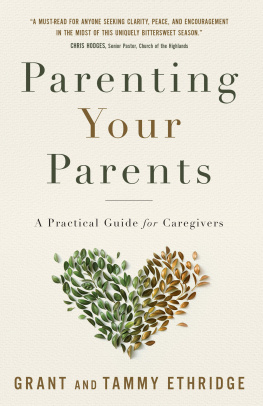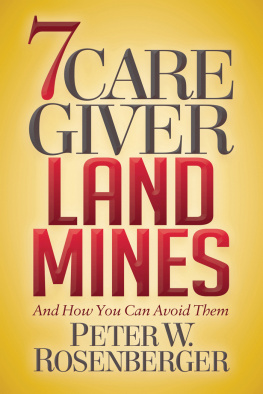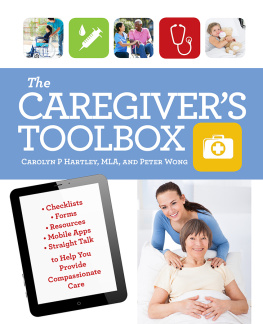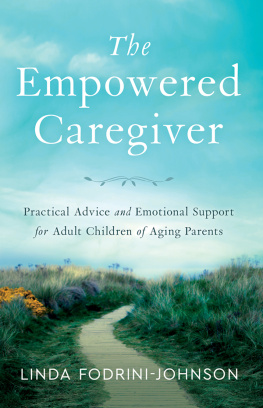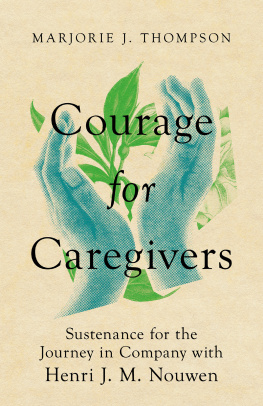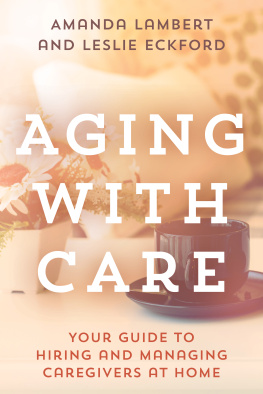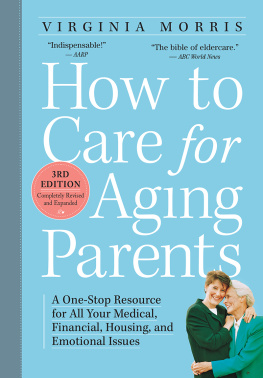FOREWORD by Roseann Vanella, Founder of Family Affairs

More than 65 million people, 29% of the U.S. population, provide care for a chronically ill, disabled or aged family member or friend during any given year and spend an average of 20 hours per week providing care for their loved one. National Alliance for Caregiving in collaboration with AARP; November 2009
Caregiving is something I have had both the fortune and misfortune of experiencing firsthand from the time I was a young girl. I grew up in a very Italian/American family. All of us lived on the same block, so to say we were close would be accurate. Parents, children, aunts, uncles, cousins grandparents and even great grandparents, were just a backyard away.
I consider myself both lucky and unlucky to have had both experiences.
It had a definite and direct impact in shaping my future in becoming a Professional Family Mediator and a Community Advocate for a global online community, being able to help families through these difficult life changes. It also gave me lifelong lessons on what caregiving truly is and how it can both be the hardest job in the world but yet the most rewarding. This is why I say that I have been both lucky and unlucky.
In order to find the rewarding part of caregiving, we have to go through a long period of suffering which may include confusion, self-doubt and guilt. When I was a young girl, there were no senior experts or much assistance in the aging arena. Someone with dementia or Alzheimers were simply said to be senile and families were left on what seemed to be a deserted island to simply try and figure it all out. Figure out not only how to care for our aging loved ones but also struggle with the variety of emotions that were unleashed from inside us.
With advances in medicine, life expectancy extension, and an ever growing population of seniors, theres more information than ever before. The problem now is that everyone seems to be jumping on this bandwagon of experts in the aging industry and its difficult to distinguish who is an expert and who is (in the mix solely for financial gain in this multi-billion dollar market.
Since I am tightly connected to the senior care industry, I consider myself very fortunate to have access to individuals who are the best in their field. Peter Mangiola is definitely one of those people who is a treasure trove of knowledge and experience in this sea of caregiving and aging experts.
Peters professional knowledge, personal experience in caregiving, and breadth of resources throughout the aging community makes him the absolute best. I have referred to Peter as a professional resource as well as for personal advice for my caregiving needs as I know he will have the answer.
Peter truly understands what caregivers experience and gives practical advice to not only help us survive but also so we and our loved ones can thrive in this difficult journey.
Roseann Vanella is the President of Advanced Mediation Solutions, a firm providing family mediation services. She is also a Community Advocate and Family Expert for FamilyAffaires.com , an online resource for families dealing with life changes. Roseann is a frequent expert and guest on TV, radio, and has been quoted in the Huffington Post and other publications. She speaks both nationally and globally on family issues and is passionate about sharing her knowledge in order to educate the public.
Roseann Vanella
Community Advocate & Publisher
FamilyAffaires.com
856-669-4974
roseann@FamilyAffaires.com
What is Guilt?
Before discussing elder care guilt and how to overcome it, it is helpful to delve into the definition of guilt and how it deceptively takes control of your life. If you are a caregiver, you are likely an other-centered person that is highly responsive to the needs of those around you while paying scant attention to your own needs. Clearly, selflessness is a great quality to have and the world needs more people like you. But there is a down side; selfless people are highly susceptible to being manipulated by those around them. And one of the most effective ways to manipulate others to get their own way is by making them feel guilty.
Most of us experience guilt at least occasionally in our dealings with others. It is the emotion we feel when we believe we have done something wrong. It is that nagging feeling that whatever we do is not good enough. That no matter how hard we try to please that person we are caring for, our efforts just dont measure up. It may have started because those you are responsible for verbally complained about all that was wrong while scarcely showing appreciation for the 99% of the time that your efforts were spot on or went above and beyond the call of duty. Now maybe its gotten to the point where no one has to say anything. Your conscience; or more accurately, your inner critic, now does all the talking.
Famous 20th Century psychologist Sigmund Freud espoused the theory that our psyche is essentially made up of three primary characters; the id, the ego and the superego. The id is like the inner child in us; the part of us that is completely self-centered and seeks to satisfy its desires whatever the costs. The superego is the critical and judgmental character that likes to throw cold water on everything and seeks to rule over the id. The ego is the adult in the room so to speak; the rational and reasonable character that carefully examines the arguments of the id and superego and mediates between the two before seeking to arrive at a decision that satisfies all parties.
Freud posited that because we lived in an imperfect world, humans did not have a perfect balance of the three characters. For some, the id is in charge well into adulthood; these are people that essentially never grew up and live their lives as adult children always looking for what they can gain out of a situation with little regard for the feelings of others. If the ego is in charge, this is the person that thinks through each situation and carefully plans each part of their lives. These traits can bring success in certain areas of life, but there is often a lack of playfulness and spontaneity. This person is likely to be working a lot and is reluctant to go on vacation.
When the superego is in charge, the person may possess some of the same traits as the ego, but with an irrationally harsh and judgmental spirit. For people in this category, nothing is ever good enough because their superego is constantly accusing. Guilt is just a regular part of their lives and often they have no idea where it originates from. Freuds theory may or may not be completely accurate, but nonetheless it is a good illustration of the inner conflicts of the human psyche and why some people experience guilt more than others.
How Negative Guilt Controls Us
Most caregivers do not have a problem with lack of guilt. To the contrary, it is excessive guilt that causes strain on relationships and becomes that self-accuser that pulls us down and leads to feelings of low self-worth. And with that cloud of guilt hanging over us, we are unable to experience the love, joy, peace and harmony we were meant to experience with those closest to us.
Here is an example: do you feel like the weight of the world is on your shoulders and anything that goes wrong is your fault? Even things you had nothing to do with and/or are beyond your control? If this describes you, then your guilt has gotten a hold of you to the point that it has taken over nearly every area of your life. To break free of the stress of your situation, you must break free of the negative guilt that is controlling you.


